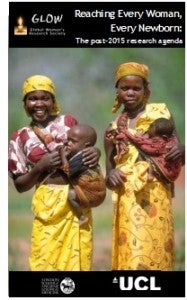 The theme for International Women’s Day this year was Make it Happen. In every country, people are coming together to advocate for women’s rights, opportunities and choices. Today’s generation is made up of the largest ever number of adolescents – but what future do they face? What about the health and hopes of the next generation?
The theme for International Women’s Day this year was Make it Happen. In every country, people are coming together to advocate for women’s rights, opportunities and choices. Today’s generation is made up of the largest ever number of adolescents – but what future do they face? What about the health and hopes of the next generation?
On March 4th 2015, the annual GLOW conference was held at the Royal College of Obstetricians and Gynaecologists (RCOG) in London, jointly hosted by the MARCH Centre of the London School of Hygiene & Tropical Medicine and the Institute for Women’s Health of University College London. Global Women’s Research society (GLOW) was created in 2012 to bring together UK-based academics to better advance research and also leadership development. The GLOW 2015 theme was “Reaching Every Women, Every Newborn: the post-2015 research agenda” and the first keynotes looked back to learn, and then looked forward.
“I am optimistic about the future,” said Richard Horton, editor of the Lancet as he opened the GLOW conference. “We are in a moment where we can end preventable deaths in women, newborns and children in one generation…Yet stillbirths are still nowhere to be seen”. The powerful opening speech from Richard Horton, the Lancet’s Editor set the tone for day.
The MARCH centre’s director, Professor Joy Lawn, underlined the need to use the data to inform the future of the Sustainable Development Goals (SDGs), ensuring that targets are set based on evidence and can actually be measured. Shifting to a life course approach, with girls and women at the centre is key to moving from a fragmented, win-lose agenda for women’s and children’s health. Plans for women need to also count stillbirths and newborns making the case for a high return on investment.
Other keynote speakers included Dr Matthews Mathai from WHO, Professor Bob Pattinson from University of Pretoria, South Africa and Professor Peter Brocklehurst of UCL, who all provided clear messages that more needs to be done to make change happen. Deaths should be audited and acted on. High quality services remain a dream if we do not measure them and make the systems accountable for these metrics. If we are to make research count, we need to get the right research question.
From the plethora of high quality research submitted, almost 40 posters showed the breadth of research around the world and throughout the continuum of care. The four top abstracts covered a randomised control trial in India for misoprositol; a meta-analysis of using symphysiotomy instead of C-section in low-income settings; near-miss neonatal death audit in Benin, Burkina Faso and Morocco; and the two year follow up of Africa’s largest cohort of neonates with hypoxic brain injury.
Much of the research presented showed clear gaps in which need to be addressed moving forward if we want to achieve our goals. Innovations are needed along with a plan for implementation change as well as intentional ways to enable leadership. The UK Royal Colleges have a key role to play in enabling research for trainees and specifically in promoting flexibility and more placements for global health training and research. The presence of many obstetric, paediatric and some very vocal midwives really enriched the discussions, as well as high-level college representatives.
The GLOW conference speaks to the values of the MARCH centre which focuses not only on the woman, or the child or the adolescent but on how we innovate and improve health at all stages of the lifecycle.
“The main message of the day is about collaboration, multi-disciplinary research in reality,” says Professor Joy Lawn, reflecting on GLOW 2015. “To make it happen we need to invest in leadership at all levels, and especially in the highest burden countries. Together, we can make huge strides for girls, women and their babies, real change for the next generation. Thank you everyone for making GLOW 2015 an inspiring and energising day.”
GLOW conference website, for more information on this year’s agenda, presentations, abstracts and posters.
For more information on MARCH at LSHTM and our 150 academic members, visit our website and follow us on twitter @MARCH_LSHTM and @joylawn.
This blog was originally posted on the website for MARCH at the London School of Hygiene and Tropical Medicine.
This post has been lightly edited for clarity.
